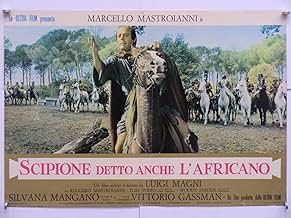PUNTUACIÓN EN IMDb
6,7/10
287
TU PUNTUACIÓN
Los hermanos conocidos como 'el africano' y 'el asiático' son acusados en el Senado, por Catón, de haberse adueñado de quinientos talentos. La intención de Catón es manchar la reputación del... Leer todoLos hermanos conocidos como 'el africano' y 'el asiático' son acusados en el Senado, por Catón, de haberse adueñado de quinientos talentos. La intención de Catón es manchar la reputación del Africano.Los hermanos conocidos como 'el africano' y 'el asiático' son acusados en el Senado, por Catón, de haberse adueñado de quinientos talentos. La intención de Catón es manchar la reputación del Africano.
- Premios
- 1 nominación en total
Argumento
¿Sabías que...?
- CuriosidadesReal-life brothers Marcello Mastroianni and Ruggero Mastroianni play, respectively, the historical figures of Scipio Africanus and Scipio Asiaticus, who were also brothers. While Marcello is one of the most famous actors in the history of Italian cinema, this movie is the only acting credit of his younger brother Ruggero. Ruggero was, however, a prolific and respected movie editor, who worked with directors like Federico Fellini and Mario Monicelli.
- ConexionesFeatured in Marcello Mastroianni: mi ricordo, sì, io mi ricordo (1997)
Reseña destacada
Much too difficult to be fully grasped by not Italian-mother-tongue people ... I'm afraid I don't agree with the main review by the Scottish fellow. Things are quite different from what appear to be, although I can understand the point of view of a non Italian ... This film is not so much about an episode in Roman history, as it is indeed about life and people themselves ... All over the world and all along times ... Here, the figure of Scipio is one that entails all men with an unbreakable ideal in their mind and his fight against a world of common people hopelessly prone to everyday trivialities ... It is a story about the impossibility for the later to comprehend the former, and about inevitability of disenchantment of this heroic figure, as he expects gratitude and respect for his out-of-the-ordinary deeds ... Even the role of his wife Emilia (well performed by Silvana Mangano) is there to underline the fact that Scipio was a problem even before his conquests, in his family relations, and afterward he became a problem to all Romans at large ... There are two connections to Greek tragedy as well in the "narrating" roles of Giove Capitolino (Turi Ferro) and Licia (Wendy D'Olive) ... Which represent the ideals of the mythological Rome of the Fathers; both of which - in the end - can't help but see Scipio go away and give up his home town with sadness and dismay ... I've watched this film every time it was broadcast by the TV, and I must admit that I myself was disappointed originally, because of some apparent approximations - like for instance the improbable aforementioned ruins - and mostly for the use in dialogues of present Roman slang ... But indeed this is an issue: The end of the heroes - like Scipio and Cato himself - didn't preserve the republic in the end and even today - in our present republic - we can see the same misery in human behavior; the ruins where already there in those times and were the ruins of humanity and decency; the use of Roman slang is the metaphor of the language of the resentful people, good only at talking about miserable things ... Scipio went to war to save his homeland and their national pride ... high-minded and ready to win or die for Rome ... But on his return, he found a different country; one without anymore fear and ready to live a quiet life in freedom and safety: NO MORE HEROES NEEDED ! Scipio learns the truth only thanks to a cruel outburst by Emilia, that clarify things to him. Then he goes to Senate and falsely confesses any kind of misdeeds ... This is the main point, in which a very cryptic (for non Italians) dialect exchange of lines explains why all that fuss was needed ... Scipio and Cato are finally aware - in private - of being probably the only two honest men in Rome, but nobody has to know ... for the sake of the Republic (in which everybody is - and must be - equal) ... the only important thing to be protected ...
*** PS. Much too difficult to be fully grasped - in the original release - by not Italian-mother-tongue people ... Not even to mention it, in a dubbed version! ...
*** PS. Much too difficult to be fully grasped - in the original release - by not Italian-mother-tongue people ... Not even to mention it, in a dubbed version! ...
- JAP_EMAIL
- 16 mar 2017
- Enlace permanente
Selecciones populares
Inicia sesión para calificar y añadir a tu lista para recibir recomendaciones personalizadas
Detalles
Contribuir a esta página
Sugerir un cambio o añadir el contenido que falta

Principal laguna de datos
What is the English language plot outline for Escipión, el africano (1971)?
Responde



























